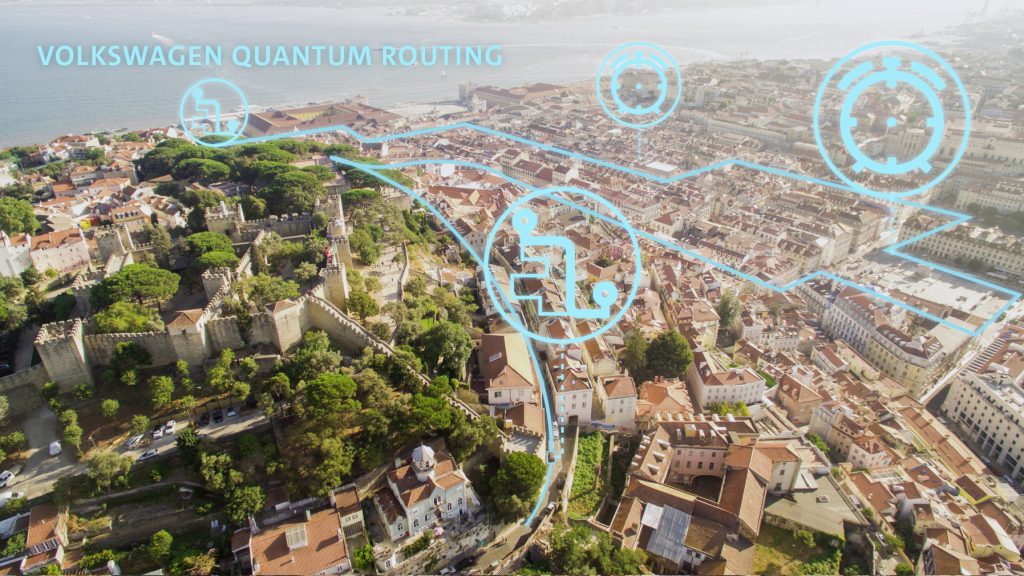
From artificial intelligence to cloud computing and beyond, Volkswagen Group of America has one of the most aggressive portfolios of technology developments in the automotive sector. That also includes research and development in quantum computing, a space where Volkswagen has worked alongside key innovators to bring cutting-edge innovation into real-world use.
Quantum computing uses the imprecise nature of quantum mechanics – the physics of how individual atoms and subatomic particles interact. Where every piece of data in a traditional computer is ultimately expressed as a binary “one” or “zero,” quantum computing relies on particles called “qubits” that can be one, zero, or both. Depending on how many qubits its chip can manage, a quantum machine can leverage tremendous computing power to solve specific tasks.
Researchers believe quantum computers could tackle challenges that even the most powerful traditional computers struggle. While quantum computers are still highly experimental, a global race to develop new machines has started, and companies have begun finding ways to apply them to real-world challenges. In the automotive industry, Volkswagen Group has led the way, launching a dedicated team for quantum computing research in 2016.
“We see great potential for quantum computing across our entire business,” said Florian Neukart, Director, Volkswagen Group Data:Lab. “Many challenges in the automotive industry can benefit from the inherent power quantum computing can generate.”

Copyright © D-Wave Systems Inc.
One issue Neukart is adamant about is that Volkswagen’s research team does not want to stay in the academic realm. “We’re not interested in doing research for research’s sake. We want to bring this technology into the real world,” he said.
For almost five years now, Volkswagen experts have been researching to find new ways to apply quantum computing to everyday challenges, said David Von Dollen, lead data scientist for Volkswagen Group of America. About 10 people work with quantum computing at Volkswagen in the U.S and Germany. Since 2017, Volkswagen has been teaming up with Canadian quantum computing firm D-Wave, and later joined with Google’s quantum computing unit for research.
“We are focused on output, on trying things, on bringing applications into use,” Von Dollen said.
One major field is mobility: In 2019, the Volkswagen team worked with D-Wave to demonstrate the first-live traffic-routing system to rely on quantum computing. The test used buses in Lisbon, Portugal, to predict traffic volumes and route trips to minimize wait times for passengers and travel times for the buses, avoiding traffic jams and making the traffic flow as efficient as possible. And the team has many more ideas and ongoing projects, Von Dollen added.
“Coming from an enterprise point of view, we always check the same questions,” Neukart added. “Where in our company could quantum computing help to solve a problem? Would a quantum application really be more efficient than a classical algorithm here? And if yes, how could this be done?”
One example has been in a key part of the automotive factory – the paint shop. Every vehicle body entering the paint shop requires one of two types of primer, depending on the final vehicle color. Changing over between primer types slows down production and raises costs, but on a complex assembly line, that cost was necessary to keep vehicles moving.
Traditionally, a paint shop might average a small number of vehicles of one primer type before needing to stop the line and switch. Using a new algorithm powered by quantum computing, designed to maximize the paint shop efficiency without slowing assembly overall, the shops could now run significantly more vehicles in a row. That system could soon go online at Volkswagen factories in Germany, and eventually worldwide.
“Challenges like these may sound simple, but in some cases would require near-supercomputer levels of power to solve with traditional hardware,” explained Von Dollen.

The Volkswagen team has also applied quantum computing to vehicle pricing to help strike the right balance for customer demand. Further afield, they see the potential for other uses, such as developing new materials or figuring out where new electric vehicle charging stations should be located to maximize their usefulness.
“Everything we learn now can give us an advantage in the future,” Neukart said. “Some challenges and questions in fields like material science may only be solvable through quantum computing. In other areas, we can take a problem that might require a week of classical computing power and finish it in a day or less.”
Neukart said Volkswagen has a unique place in quantum computing as both researcher and end-user in the automotive world, but that given the technology’s complexity and potential, it was a key reason why Volkswagen has been able to find real-world uses for it.
“We want to be leading in showing real-world applications in the mobility space,” added Von Dollen “and I think we’re really pushing the field forward.”
